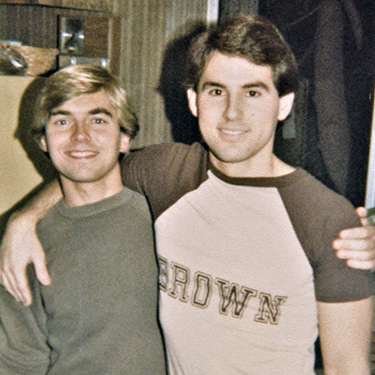Since their romance began in 1978, Scott Westerfield ’79 and Ed Miskevich ’79 have accumulated more than 40 years of memories and stories. There's the first date story when they attended a Halloween party together. And the one about how they inadvertently were part of a landmark LGBTQ court case. (More on that later.) Then, there's the time they were one of the 18,000 same-sex couples married in California before the passage of Proposition 8.
Every one of those stories has a beginning, and they all started at Brown.
The two first met in fall 1978. Westerfield had just returned to campus after taking a year off when he decided to attend an open house for the Gay Students Association. There he met Miskevich, the organization's president. The following month, they went on their first date. By November, the two were official.
"Coming out during that time, it wasn't the best environment," Westerfield says. "Younger people today are coming out in high school or even earlier. I could never think about coming out in high school. People were not as enlightened as they are now."
 "Accidental activists"
"Accidental activists"
During their time at Brown, the two worked with the Gay Students Association to support others and foster an environment where LGBTQ students could feel comfortable and welcomed. Their efforts weren't restricted to just College Hill either. Their outreach turned Miskevich into what he calls an "accidental activist."
He had been mentoring a group of gay students, some of them from Cumberland High School, north of Providence, providing them with a forum to talk about their common issues and seek guidance. When one student—Paul Guilbert—confided in Miskevich that he wanted to go to prom but didn't have anyone to go with, Miskevich gladly offered to be his date. "I thought, 'Let's do it. What's the worst that could happen?'" Miskevich recalls.
The school's principal, Richard Lynch, denied Guilbert's request to bring Miskevich as his date, citing a concern that their presence might elicit a "student reaction" that could disrupt the dance and potentially endanger the pair. The story made national news and, though the two did not end up attending the prom, the conflict opened the door for another student to walk through. That student, Aaron Fricke, asked Principal Lynch for permission to bring Guilbert the following year as his date to a dance, the fallout from which would precipitate Fricke v. Lynch—a landmark case that helped solidify LGBTQ students' rights in public schools.
"It opened up a completely new mindset in both of us," says Westerfield. "We both became activists through our experience at Brown."
Even after graduation the two continued to advocate for gay rights, participating in marches (including the Second National March on Washington for Lesbian and Gay Rights in 1987) and taking larger leadership roles in their community in California. Westerfield became the president of the Eleanor Roosevelt Democratic Club, the LGBTQ club in Orange County. He also joined the central committee of the Orange County Democratic Party.
"You find a lot of people from Brown who believe in social activism," Miskevich says. "As the AIDS epidemic continued and more people were dying, we realized we had to be leaders. We were taught to be leaders. We were taught to take difficult positions."